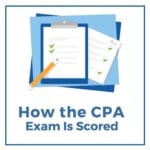The Regulation (REG) test is one of four CPA exam sections (along with AUD, FAR, and BEC). The bulk of this test consists of questions relating to business law and federal tax procedures..
This guide explains the format of the REG test, outlines important tips that will help you answer a large number of federal taxation questions, and provides some guidance on creating a study plan.
If you’re studying for the REG test and starting to feel overwhelmed, read on. We’re here to help!
See the Top CPA Review Courses
- 1. Becker CPA Review Course ◄◄ Endorsed by Big 4 Accounting Firms + Save $1,330
- 2. Surgent CPA Prep Course ◄◄ Best Adaptive Technology
- 3. Gleim CPA Study Materials ◄◄ Largest CPA Test Bank
REG Exam Format
The CPA REG exam format is similar to several other tests on the Certified Public Accountant exam.
As the AICPA explains: “Each of the four exam sections is broken down into five smaller sections called testlets. These testlets feature multiple-choice questions (MCQs) and task-based simulations (TBSs). You will receive at least one research question (research-oriented TBS) in the AUD, FAR and REG sections.”
REG CPA Time Allocation
The CPA Exam includes four tests; candidates have four hours to take each test. Completing your REG test in four hours can be challenging, because business law and income tax questions require you to read carefully. Consequently, you must know the material well so that you can answer quickly once you read the material.
REG CPA Exam Study Tips
Here are some broad financial accounting topics that make up a large percentage of questions on the REG section of the CPA exam. Use these tips to successfully answer difficult questions on these content areas:
Agency and Principal Concepts
When CPAs move into management, they need to understand the rights and responsibilities of both full-time employees and independent contractors. To address this issue, the REG test covers the concept of agency and the relationship between agents and principals.
If you’re had a business law course, you learned that agents and principals have a legal relationship. Furthermore, you should know that an agent is authorized to act on behalf of a principal. Simply put, an agent (worker) is authorized to do certain tasks for the principal (employer).
Let’s assume that Joe owns Reliable Tree Services and Paul is a foreman who manages a work crew. Paul is the agent, Joe is the principal, and Paul has consent from Joe to perform tree service work.
In legal terms, the principal gives consent and has capacity, meaning that Joe provides the vehicles and equipment so that Paul can do the work. As the agent, Paul is authorized to create a legal relationship with third parties so that tree service work can be performed.
The next question is: What exactly is Paul authorized to do?
Just about everyone has dealt with this issue as an employee or contractor, even when you held a part-time job as a teenager. The REG test covers several types of authority, and these concepts can be confusing. Therefore, you should invest the time to read these descriptions carefully during your exam study so that you can answer questions on agency topics.
- Actual authority: Workers are often given specific instructions about work that needs to be performed; this defines actual authority. In legal language, the principal’s words or actions cause the agent to reasonably believe that he or she is authorized to act. When Joe tells Paul to take down a 20-foot tree at the Johnson’s residence, Paul has actual authority.
- Apparent authority: Sometimes, the employer’s instructions are not precise and the worker must act based on apparent authority. In this case, the agent has authority because the principal’s words or actions lead a third party to reasonably believe that the agent has authority to act. If, for example, Paul gives a customer a bid to remove a tree, the customer (a third party) will assume that Paul is authorized to perform the work.
- Implied authority: If an agent can reasonably expect to carry out a particular duty as part of an expressed authority, the agent also has implied authority. When Paul takes down a tree for Joe’s company, the work crew must remove the tree stump, limbs, and other debris from the yard. This step is based on implied authority.
To keep these authority concepts straight, think about your own experience as a consumer. The agency concepts exist, in part, to protect the consumer. When you read about situations that might harm a customer, it’s likely that the agent, the principal, or both parties will be held liable if the customer is harmed.
Keep that point in mind as you read through agency questions on the REG test.
[uam_ad id=”7978″]
Taxation
Taxation is a difficult CPA exam topic for several reasons:
First, the tax law changes constantly and some of the test material for this section changes from one year to the next. If you did tax preparation several years ago, for example, the dollar amounts for the standard deduction on personal tax returns has changed.
You can’t rely on tax rules learned in past years to pass the taxation section today.
Second, many CPA candidates don’t work as tax preparers. Consequently, tax information is not in the front of their minds.
A number of tax questions cover the Form 1040 personal tax return; these rules can be confusing. To clarify these topics, print a copy of the 1040 form and refer to it as you study. When you see a question on federal taxation of property transactions or itemized deductions, for example, look at the 1040 form and note where these concepts are posted on the return.
If you can visualize where tax information is recorded on the form, you’ll start to connect personal tax concepts in your mind. Income, for example, is posted at the top of page 2 of the 1040 form, while the tax liability is posted further down the page.
Ultimately, implementing this process into your CPA review can help you make sense of the personal tax concepts on REG.
Finally, use flashcards to memorize the facts and figures on the taxation section. You’ll need to know a variety of facts; the easiest way to digest this information is to go through flashcards.
Tax Preparer Responsibilities
A large portion of the REG test covers the rules governing tax preparers.
The IRS Office of Professional Responsibility is responsible for the conduct of tax preparers. Furthermore, this office handles disciplinary proceedings for tax preparation issues. These rules are stated in IRS Circular 230; you may see this circular mentioned in REG test questions.
Keep reading to understand these frequently covered tax issues on the REG test.
Practicing before the IRS
When a person is involved in tax preparation, the work is referred to as “practicing” before the IRS.
Tax preparation includes preparing and filing documents, corresponding with the IRS, providing written advice regarding a tax transaction, and representing a client at a meeting or a hearing.
Preparer tax identification number
Anyone who prepares taxes for compensation must have a preparer tax identification number (PTIN). To receive a PTIN, a tax preparer must be an attorney, CPA, enrolled agent, or registered tax return preparer.
Providing information to the IRS
The REG test frequently includes questions regarding client records and if they can be furnished to the IRS.
If the practitioner (tax preparer) believes in good faith and on reasonable grounds that the records are privileged, he or she is not obligated to give the records to the IRS.
In some REG test questions, the IRS is looking into a potential violation of tax law. Consequently, you will be asked whether or not the practitioner can release records. Generally speaking, a tax preparer must provide records if requested by a court of law.
If the practitioner does not have the records, the practitioner must provide the IRS information about the person who has the records, if the practitioner has that data.
Knowledge of a client omission
Many tax preparers encounter clients who are not fully compliant with the tax code; the REG test covers these situations.
If the preparer knows that the client is not complying with a specific tax law, the tax preparer must notify the client promptly. The issue may be a tax return schedule, a supporting document, or some form of correspondence with the IRS.
Additionally, the tax preparer must explain the consequences of not complying with the tax code. Furthermore, the client may be subject to fees, penalties, fines, or even legal action.
Preparing accurate returns
Essentially, practitioners must exercise due diligence when preparing taxes. Like many other professions, a tax preparer must use a professional level of care, and preparers may face fines and penalties- or even legal action- if due care is not used.
Retaining client records
A tax preparer must return all records to the client promptly. Additionally, the preparer is allowed to keep copies of the records.
Note that records must be returned even if there is a dispute over fees charged to the client. While there are some exceptions, a fee dispute generally doesn’t relieve the tax preparer of the responsibility to return the tax records.
This question appears on most REG tests, so pay careful attention to these concepts during your exam review!
Learn More About The CPA Exam
- How To Become A CPA
- CPA Exam Stats and Facts
- Best Order To Take CPA Exam
- Motivational Songs For Studying
Charging Fees

On a basic level, fees charged by preparers must be reasonable; the IRS states that fees cannot be “unconscionable”.
As the name implies, the amount of a contingency fee depends on a particular outcome. Furthermore, the ability to charge a contingency fee is strictly limited.
Defining contingency fees
The IRS defines a contingency fee as a fee that is based on a tax position that avoids a challenge by the IRS. If a tax position is sustained (left in place) by the IRS or sustained in litigation, a contingency fee can also be charged. Finally, this fee can be based on a percentage of a refund reported on a return or computed based on a percentage of taxes saved.
When contingency fees are allowed
Here are the situations in which a tax preparer can accept a contingency fee:
- Original tax return: When the IRS is examining the original tax return and the IRS is challenging a tax position taken by the taxpayer, a contingency fee may be charged.
- Amended return: If a taxpayer receives a written IRS notice of an examination, or a challenge to the original return, and an amended return is filed within 120 of the notice, the preparer can charge a contingency fee.
- Statutory interest and penalties assessed: A contingency fee can be charged if the IRS is determining an assessment of statutory interest and penalties.
- Judicial proceeding: If the taxpayer is the subject of a judicial proceeding involving the IRS, a contingency fee can be charged.
Several of these situations will be covered on your REG test.
Conflicts of Interest
Tax preparers must not represent clients if the relationship creates a conflict of interest.
A conflict of interest exists if representing client A will be directly adverse to client B. Assume, for instance, that two business partners are in a dispute over the amount company profits reported on each partner’s personal tax return. If one tax preparer represented both partners, it would be a conflict of interest.
If representing one client will be materially limited by the responsibilities to another client, a conflict of interest also exists.
 Advertising and Solicitations
Advertising and Solicitations
Just as with many other industries, a tax preparer cannot make a solicitation using a false, fraudulent, coercive, or deceptive claim.
Another rule exists to prevent a taxpayer from viewing an enrolled agent as an employee of the IRS. When describing their services, enrolled agents cannot use the word “certified”, or imply employment with the IRS.
An enrolled agent can use this language in advertising and solicitations:
- “Enrolled to represent taxpayers before the Internal Revenue Service,”
- “Enrolled to practice before the Internal Revenue Service,”
- “Admitted to practice before the Internal Revenue Service.”
Tax preparers are allowed to use the following type of fee information on advertising and solicitations:
- Explain that a written schedules of fees is available
- State the fixed fees charged for specific routine services (fee for a simple Form 1040 return, for example)
- Hourly rates
- The range of fees for a particular service
- Fee charged for an initial consultation
These rules should be familiar if you’ve seen advertisements for tax preparation services.
Take special note of all these tips to ensure that you can pass the REG exam. Basically, if your CPA review course doesn’t include sections discussing relationships between agency and principal, or the intricacies of federal taxation of individuals, you may need to find a new one!
Our top tips for the REG CPA Exam section:
- Be proactive and study early and regularly so you don’t forget material.
- Familiarize yourself with hard topics like federal taxation, like income, gift and estate taxation.
- Practice as much as you can in applying concepts, it makes them easier to understand and remember.
Get Discounts On CPA Review Courses!

Extended Sale – Get $1,330 Off Becker CPA Pro

Take $1,110 Off Surgent CPA Ultimate Pass

Enjoy $1,000 Off Gleim CPA Premium Pro
CPA REG Practice Exams
Before you start working on practice exams, take a look at the most current AICPA Blueprint for the REG test. This document lists the percentage of test questions for each topic.
After you work a practice exam and review your incorrect answers, refer to the Blueprint. If you missed a number of questions on a topic that is heavily tested, invest more time to review that particular concept.
This strategy will help you use your study time effectively and focus your efforts on the most-tested material.
Create a plan
Estimates vary, but most CPA exam candidates spend 300-400 hours to study for and pass the CPA exam. Hence, to make the most of your available time, you should create a written plan.
Putting a plan in writing forces you to consider other time commitments, such as your work schedule, personal commitments, holidays, etc. Create a plan to set up a reasonable amount of time to study for each test.
Use the AICPA practice exams
Most CPA candidates purchase study materials that already offer practice exams. However, don’t forget that the AICPA offers some free sample tests. Use this free resource to brush up on REG CPA exam content; you won’t regret it!
Be Diligent
The REG test, more than any other test on the CPA exam, requires a focus on details. Consequently, studying so much detail can be draining. To combat this, create a plan of study and stick with your plan. Because of the amount of detail on REG exam questions, you may see low scores on early practice tests. Hang in there and keep going if you want those scores to improve.
Use this guide to study for and pass the REG test. Let’s keep those pass rates high and Beat the CPA!
COMPARE THE BEST CPA REVIEW COURSES
Frequently Asked Questions about REG CPA
How many hours should you study for REG CPA?
It’s a good idea to devote at least one-fourth of your total exam study time on the REG section of the exam. This means you should try for around 100 study hours if you’re following the general advice of 300-400 cumulative CPA exam study hours.
Is REG CPA exam hard?
All four sections of the CPA exam are difficult; after all, the point of the test is to prove that you’re a knowledgeable accounting expert. However, REG isn’t the hardest section of the exam to pass according to data gathered by the AICPA, so it’s considered slightly easier than the AUD and FAR sections.
What should I focus on for REG CPA exam?
When studying for the Regulation section of the CPA exam, you’re going to want to brush up on your knowledge of regulatory concepts related to accounting. This means you should look for a CPA prep course that offers content focused on business law and ethics.
How do I pass my REG?
The best way to ensure that you pass the REG exam is the same way to prepare for any exam: make a strict study schedule and follow it. If you need help staying motivated and focusing your study efforts in the right direction, consider signing up for a CPA prep course with adaptive learning technology like Surgent.








